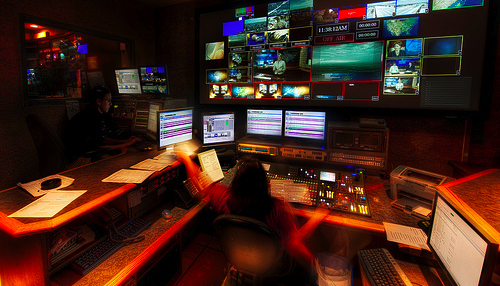Why Twitter inherently reports news before traditional media

During notable events of world affairs, in retrospect we often hone in on an angle repeated event after event: "Twitter broke the story".
From the notable citizen reporting during the student uprising in Iran, to the revolutions in North Africa, Egypt -- many news stories will inherently be reported on the social media site long before traditional media picks it up.
From the BBC to CNN, on MSNBC and on our sister site CBS News, these news organisations all but require correspondents and editors from all walks of life, with various specialities and fields of knowledge, to be posted at strategic events and places throughout the world.
With this, it allows political stories, economic issues and social affairs news to be covered often before the Twittersphere hears about it.
But this inherently leaves a void for news-hungry and ever increasingly competing news services. The decentralised ad-hoc network of "citizen journalists" chipping in if and when they encounter a notable event can often be far better equipped than the traditional journalists of the day.

There is without doubt a key need to have news correspondents in session, because it is news that the vast majority may not particularly care about, but will cover it for the sake of public interest nonetheless.
Think of it from a secret intelligence service point of view. The intelligence officers are the editors -- overseeing the whole range of agents, the correspondents under them, to collect information on a vast scale through various other people, sources and connections, all to report back to base.
Strangely enough, an intelligence service is very similar to a broadcasting organisation -- with the obvious difference of secrecy versus the need to serve one's public.
Twitter relies on social capital. People think of Twitter as an entity -- rather than the decentralised hub of human communication that it is. People regard Twitter as a "something" rather than the collective that it is. Though it is a site, a brand and a company in itself -- similarly to an ideology or a collective, Twitter is in essence another word for "many people tweeting".
Imagine the basic Twitter interface. It is an insight into anyone and everyone's lives -- a peeping tom view of the world, allowing you to see the most intimate details of someone's life, to the degree that they are willing to share.
News works very much in this way. Twitter accounts on the most part are run by humans -- with a minority out of the vast hundreds of million users acting autonomously as 'bots'; retweeting and collecting key words and communicating with others without the need for a human host.
Because so many people are connected to Twitter, news can spread virally. The more viral it becomes -- either through retweets or highlighted keywords, Twitter then recognises this by 'trending' it -- perpetuating the further viral nature of the initial tweet.
Though, this seems to be obvious in its nature. Of course Twitter works in this way -- it is what it is designed to do.
But as the media organisations realise that Twitter and Facebook, and other microblogging sites and social networks are so crucial in getting the news out there faster, it is no wonder that most news networks have a presence on the site with their own Twitter account.
Interconnecting services and applications, pushing tweets to mobile devices, is merely only a small element to it.
As tweets are instant and pushed out to followers on a second by second basis, it is easy to become overloaded with information. But this is no trouble for the digesting underbelly of the mainstream media organisations.
Twitter is a central place for information to be shared. With this, it is more common for a news editor or correspondent to break news on Twitter for the simple reason in being that there are more people there.
Only a small portion of Twitter users regularly visit the BBC website, or CBS News, or any other mainstream media organisation. Many Twitter users are not interested in the news, or reading newspapers or watching live news broadcasts twenty-four-seven. Others, however, are.
But they are interested in what others have to say -- namely their friends and predominantly their followers; followers for which may be interested in the news, or current affairs. Everyone has an opinion on something; how strong that opinion is, however, is proportional and relative to other peoples' beliefs, knowledge base and levels of interest and intellect.
It is a giant, convoluted and ever expanding spider diagram, for which this article does not fully do it justice. There is a method to the madness, but sometimes to accept that "it just does" may not be enough to fully understand how powerful this social platform of millions of people really is.
See also:
- Twitter celebrates five year anniversary, still going strong
- Why every student should be on Twitter
- How Mumbaikars used Twitter and Google to coordinate help during the terrorist attack
- Twitter reaches 1 million registered applications
- Twitter being valued for as much as $7 billion
- Report: Twitter under investigation by Federal Trade Commission
- It's time to get real, folks: Twitter and Facebook aren't fads and here's why
- Twitter's 'landmark' court ruling: Why British free speech is over
- Goodbye social media... welcome back mass-media